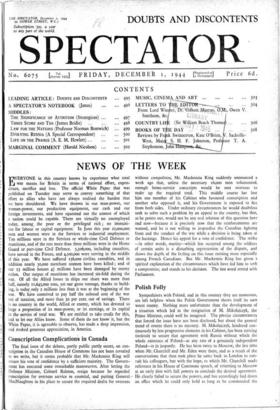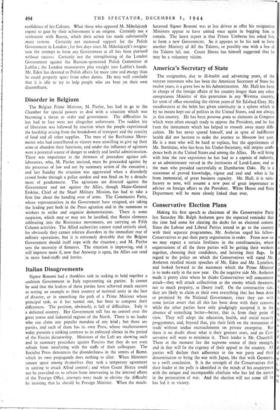Polish Folly
Sympathisers with Poland, and in this country they are numerous, are left helpless when the Polish Government shows itself its own worst enemy. Nothing more unfortunate than the development of a situation which led to the resignation of M. Mikolajczyk, the Prime Minister, could well be imagined. The precise circumstances that forced the issue have not been disclosed, but about the general trend of events there is no mystery. M. Mikolajczyk, hindered con- tinuously by less progressive elements in his Cabinet, has been striving tirelessly to secure that agreement with Russia without which the whole existence of Poland—at any rate of a genuinely independent Poland—is in jeopardy. He has been twice to Moscow, the last time when Mr. Churchill and Mr. Eden were there, and as a result of the conversations that then took place he came back to London to con- sult his colleagues, but with the hope, to which Mr. Churchill made reference in his House of Commons speech, of returning to Moscow at an early date with full powers to conclude the desired agreement. He clearly failed to secure the powers, and has accordingly laid down an office which he could only hold as long as he commanded the
confidence of his Cabinet. What those who opposed M. Mikolajczyk expect to gain by their achievement is an enigma. Certainly not a settlement with Russia, which their action has made substantially more remote. Certainly not increased support for the Polish Government in London ; for five days since M. Mikolajczyk's resigna- tion the attempt to form any Government at all has been pursued without success. Certainly not the strengthening of the London Government against the Russian-sponsored Polish Committee at Lublin ; the London manoeuvres play straight into Lublin's hands. Mr. Eden has devoted to Polish affairs far more time and energy than he could properly spare from other duties. He may well conclude that it is idle to try to help people who are bent on their own discomfiture.



























